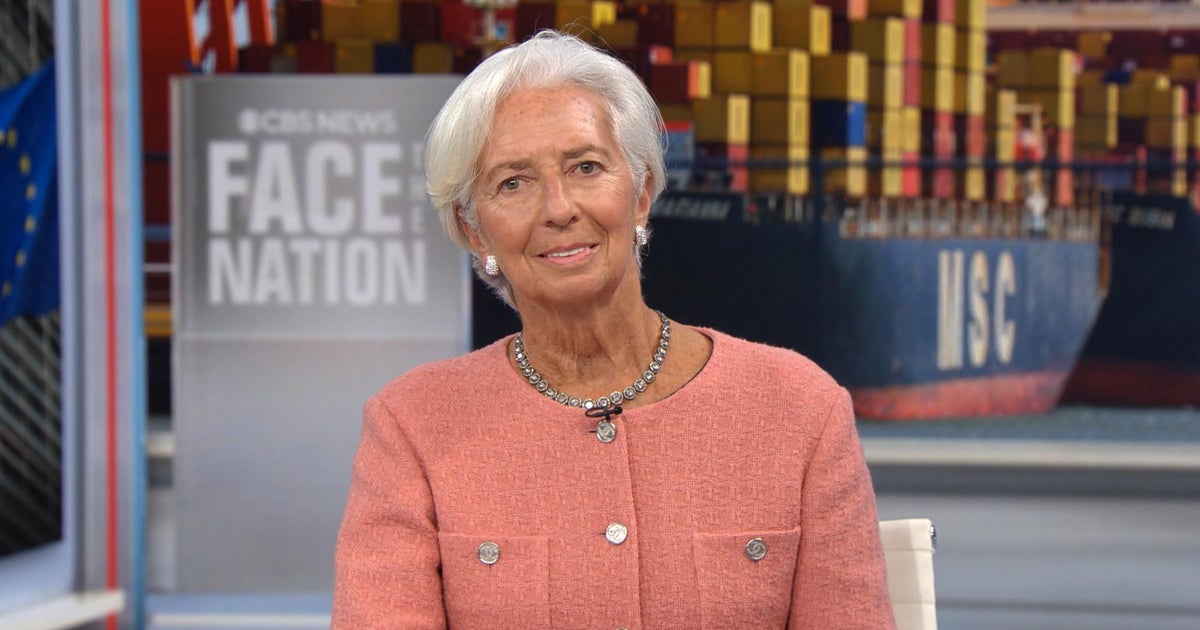World
Christine Lagarde Discusses Global Economic Transformation and Challenges

During an interview on “Face the Nation” with Margaret Brennan on October 19, 2025, Christine Lagarde, the President of the European Central Bank, provided insights on the current state of the global economy. Lagarde described the economy as being in a state of transformation, influenced by factors such as tariffs and the rapid advancement of artificial intelligence.
Economic Transformation and Trade Tariffs
Lagarde highlighted the significant impact of tariffs on global trade dynamics. She noted that the tariffs imposed by the United States have altered trade relationships worldwide, creating new alliances and reshaping how countries interact economically. According to forecasts from S&P Global, Trump’s tariffs are expected to cost global businesses upwards of $1.2 trillion this year, with many of these costs ultimately passed on to consumers.
Lagarde remarked that while some economists may have overestimated the immediate impact of these tariffs, she believes the global economy has yet to fully feel the pain. She provided specific figures indicating that tariffs on European goods exported to the U.S. have risen from 1.5% to 13% due to recent U.S. policies. This increased burden is currently divided among exporters, importers, and consumers, suggesting that the long-term effects may soon be felt by consumers as companies struggle to maintain their profit margins.
“It’s a question of time,” Lagarde stated, referring to how long companies can absorb these costs before passing them onto consumers. She emphasized the importance of monitoring how businesses respond to these pressures in the coming months.
U.S.-China Relations and Currency Concerns
The discussion then shifted to the ongoing trade tensions between the United States and China. Lagarde addressed the recent comments from U.S. Treasury Secretary Scott Bessent regarding upcoming meetings with Chinese officials amid escalating tariff threats. She characterized the current climate as typical of negotiation strategies, where both sides display assertiveness before reaching a compromise.
Lagarde acknowledged China’s strong position in the rare earth market, which it has cultivated over time. She advocated for a unified approach from Europe and the U.S. in negotiations, suggesting that both regions should collaborate as a purchasing force against China’s selling strength. This joint effort could potentially offset the leverage China currently holds.
On the topic of the U.S. dollar, Lagarde expressed concern that its status as the world’s primary safe-haven currency might be diminishing. She pointed to signs of erosion in confidence in the dollar, noting the rising prices of gold and increasing capital flows away from the U.S. to other regions, including Europe. “When you look at the price of gold, it has increased by more than 50% since the beginning of the year,” she said, indicating that investors may be seeking alternatives.
Lagarde emphasized the importance of maintaining geopolitical credibility and strong institutions to uphold trust in the dollar. She cautioned that the gradual erosion of such confidence could lead to sudden shifts in the currency’s status, similar to historical precedents involving other currencies.
Support for Ukraine and Future Economic Outlook
In the context of the ongoing conflict in Ukraine, Lagarde shared her recent conversation with President Volodymyr Zelenskyy regarding the use of frozen Russian assets. She proposed that a fair approach to utilizing these assets would involve operational loans backed by cash balances from countries holding Russian assets. Lagarde believes that this strategy could help in financing the reconstruction of Ukraine while putting pressure on Russia to engage in negotiations.
As the global economy navigates these complex challenges, Lagarde’s insights underscore the interconnectedness of trade, tariffs, and geopolitical dynamics. Her perspective highlights the need for cooperation among nations to address the evolving economic landscape effectively. The coming months will be crucial in determining how these various elements will unfold and impact global markets and consumers alike.
-

 Science1 week ago
Science1 week agoResearchers Challenge 200-Year-Old Physics Principle with Atomic Engines
-

 Politics1 week ago
Politics1 week agoNHP Foundation Secures Land for 158 Affordable Apartments in Denver
-

 Health1 week ago
Health1 week agoNeuroscientist Advocates for Flag Football Until Age 14
-

 Lifestyle1 week ago
Lifestyle1 week agoLongtime Friends Face Heartbreak After Loss and Isolation
-

 Health1 week ago
Health1 week agoFDA Launches Fast-Track Review for Nine Innovative Therapies
-

 Politics1 week ago
Politics1 week agoIsraeli Air Strikes in Lebanon Kill One, Wound Seven Amid Tensions
-

 World1 week ago
World1 week agoTroops to Enjoy Buffalo Chicken, Thai Curry in 2026 MREs
-

 Business1 week ago
Business1 week agoMaine Housing Inventory Surges to Post-Pandemic High
-

 Top Stories1 week ago
Top Stories1 week agoUnforgettable Moments: The Best Victoria’s Secret Performances
-

 Politics1 week ago
Politics1 week agoMassachusetts Lawmakers Resist Audit After Voter Mandate
-

 World1 week ago
World1 week agoGlobal Military Spending: Air Forces Ranked by Budget and Capability
-

 Business1 week ago
Business1 week agoSpirit Airlines Cuts Workforce with Furloughs for 365 Pilots









